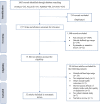Associations between dietary intake, diet quality and depressive symptoms in youth: A systematic review of observational studies
- PMID: 36686054
- PMCID: PMC9808911
- DOI: 10.34172/hpp.2022.32
Associations between dietary intake, diet quality and depressive symptoms in youth: A systematic review of observational studies
Abstract
Background: Depression is the third leading cause of worldwide disease burden among youth, and nutrition- and diet-related behaviors have been considered as an effective strategy for reducing the risk of depressive symptoms. This systematic review aims to examine associations between dietary intake and diet quality with depressive symptoms among youth. Methods: In this systematic review, a search of scientific articles published between 2000 and 2021 was performed in four databases (CINAHL, Embase, PsycInfo, and PubMed) according to the PRISMA checklist. After applying inclusion and exclusion criteria, observational studies that focused on associations between micronutrient, macronutrient, food group intake, and diet quality and depressive symptoms among youth, ages 3 to 18, were selected for review. Results: Thirty-two articles met the review criteria. Dietary intake of magnesium, vitamin B12, fiber, fruits, vegetables, and fish were consistently inversely related to depressive symptoms. However, the evidence of associations between intake of vitamins B6, C, D, and E, iron, copper, zinc, omega-3 fatty acids, carbohydrate, and dietary fat and depressive symptoms was mixed. Dietary effects on decreased depressive symptoms were more pronounced in children than adolescents. Additionally, most studies failed to adjust for potential confounding variables. Conclusion: This review provides preliminary and comprehensive evidence for a relationship between dietary intake, diet quality, and depressive symptoms in youth. Although the results are heterogeneous and more research is needed, our findings indicate the importance of nutrition interventions for youth for decreasing depressive symptoms or for preventing further symptom exacerbation.
Keywords: Adolescent health; Child Health; Depression; Diet quality; Eating; Systematic review.
© 2022 The Author(s).
Similar articles
-
Dietary intake in population-based adolescents: support for a relationship between eating disorder symptoms, low fatty acid intake and depressive symptoms.J Hum Nutr Diet. 2013 Oct;26(5):459-69. doi: 10.1111/jhn.12024. Epub 2012 Dec 6. J Hum Nutr Diet. 2013. PMID: 23216519
-
The Association between Post-Partum Depression and Nutrition and Dietary Patterns: Systematic Review.Iran J Nurs Midwifery Res. 2024 Jul 2;29(3):280-289. doi: 10.4103/ijnmr.ijnmr_163_22. eCollection 2024 May-Jun. Iran J Nurs Midwifery Res. 2024. PMID: 39100402 Free PMC article. Review.
-
Diet and obstructive lung diseases.Epidemiol Rev. 2001;23(2):268-87. doi: 10.1093/oxfordjournals.epirev.a000806. Epidemiol Rev. 2001. PMID: 12192737 Review.
-
Nutritional intakes in community-dwelling older Japanese adults: high intakes of energy and protein based on high consumption of fish, vegetables and fruits provide sufficient micronutrients.J Nutr Sci Vitaminol (Tokyo). 2004 Jun;50(3):184-95. doi: 10.3177/jnsv.50.184. J Nutr Sci Vitaminol (Tokyo). 2004. PMID: 15386931
-
The relationship between nutrition and depression in the life process: A mini-review.Exp Gerontol. 2023 Feb;172:112072. doi: 10.1016/j.exger.2022.112072. Epub 2022 Dec 21. Exp Gerontol. 2023. PMID: 36565729 Review.
Cited by
-
Exploring Depression and Nutritional Covariates Amongst US Adults using Shapely Additive Explanations.Health Sci Rep. 2023 Oct 20;6(10):e1635. doi: 10.1002/hsr2.1635. eCollection 2023 Oct. Health Sci Rep. 2023. PMID: 37867784 Free PMC article.
-
The Impact of the COVID-19 Pandemic on the Physical and Mental Health of School-Aged Children.HCA Healthc J Med. 2023 Jun 28;4(3):223-228. doi: 10.36518/2689-0216.1547. eCollection 2023. HCA Healthc J Med. 2023. PMID: 37434906 Free PMC article. Review.
-
Risky Behaviors for Non-Communicable Diseases: Italian Adolescents' Food Habits and Physical Activity.Nutrients. 2024 Nov 30;16(23):4162. doi: 10.3390/nu16234162. Nutrients. 2024. PMID: 39683555 Free PMC article.
-
The Prevalence of Hyperuricemia and the Association Between Hyperuricemia and Age in Patients with Psychiatric Disorders to a General Hospital: A Cross-Section Study.Int J Gen Med. 2024 Apr 17;17:1467-1477. doi: 10.2147/IJGM.S454670. eCollection 2024. Int J Gen Med. 2024. PMID: 38645402 Free PMC article.
References
-
- World Health Organization. Depression. Available from: https://www.who.int/news-room/fact-sheets/detail/depression. Accessed July 25, 2021.
-
- World Health Organization. Child and Adolescent Mental and Brain Health. 2021. Available from: https://www.who.int/activities/improving-treatment-for-snakebite-patients. Accessed August 18, 2021.
Publication types
LinkOut - more resources
Full Text Sources
Miscellaneous



